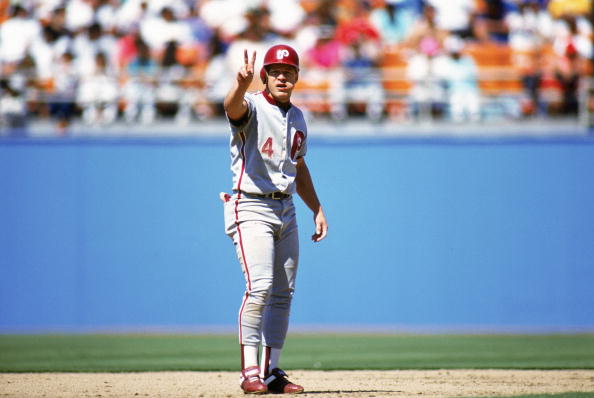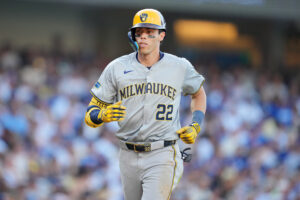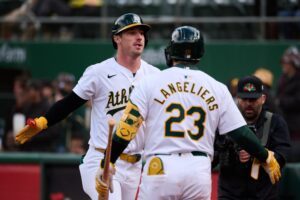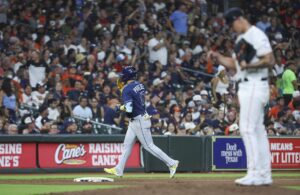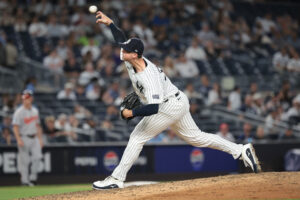Sometimes, comebacks are built upon a roller coaster, twisting and turning until one can no longer feel one’s constitution. Then, there are the times when comebacks are created from a single event, pushing a team further along the path to victory. Whether they be formed from singularities or pluralities, comebacks all have the common denominator of excitement. That is what we discuss in the runner-up on Baseball Reference’s list of great fight-back moments. Today’s game still uses a shared combination of these categories. It came down to two separate innings, each as equally impressive as the other. But let’s dive in and examine the players on this stage first.
Comeback #2
August 21, 1990: Philadelphia Phillies vs. Los Angeles Dodgers
Player #1
The 1990 Los Angeles Dodgers were a team seeking to rebound. After winning a World Title in 1988, they’d slipped to fourth place in ’89. The 1990 iteration held many of the same problems, though they’d improve to second in the division. Former MVP Kirk Gibson had regressed a lot, though the rest of the offense was solid. Kal Daniels and Hall of Famer Eddie Murray led the way. Murray, in particular, had an excellent season (.330 avg, 26 HR, 95 RBI, 159 OPS+). Kal Daniels swatted 27 homers, Mike Sharperson hit .297, and Hubie Brooks had 151 hits. Other than that, the offense was okay.
The starting rotation was defined by one player: Ramon Martinez. His 20 wins, 2.92 ERA, and league-leading 12 complete games helped him place second in Cy Young Award voting. Other than that, the staff was so-so, with pitchers having ERA numbers ranging between three and five. Bullpen-wise, they were wildly inconsistent. Four of their regular relievers had ERAs well below three. Closer Jay Howell saved 16 contests. However, they also blew 19 of their 48 save opportunities, leading to an abysmal 60% success rate, second-lowest in the league.
Player #2
That year’s Philadelphia Phillies were in an extended stretch of bad luck. Success in the late 1970s and early 80s had melted away. Unfortunately for Phillie fans, manager Nick Leyva did not have a lot to work within 1990, either. Offensively, the team was somewhat stagnant. Lenny Dykstra hit .325, and Von Hayes led the squad with 17 homers. Other than that, most of the offensive totals were near the bottom of the league’s barrel. Not even a trade for Atlanta Braves legend Dale Murphy could save things.
On the mound, the Phillies were possibly worse. A 4.07 team ERA went along with an ERA+ of 93. Staff ace Pat Combs won 10 games with a 4.07 ERA. However, bad performances from Bruce Ruffin (5.38 ERA, 71 ERA+) and Ken Howell (4.64 ERA, 82 ERA+) helped sink the team. Jason Grimsley was the lone bright spot in the rotation (3.30 ERA, 116 ERA+). Joe Boever performed spectacularly in the bullpen, posting a 2.15 ERA and a 178 ERA+. Closer Roger McDowell saved 22 contests. Dennis Cook and Darrel Akerfelds each had ERA+ numbers slightly above average. Other than that, the bullpen was just as clunky as the rest of the team.
The Beginning
So it was that these two met on a Tuesday night in August at Dodger Stadium. For Los Angeles, there was still something to play for in this game. The NL West-leading Cincinnati Reds were only 5 ½ games ahead with 41 games left. While not the tightest race, it was still conceivable that the Dodgers could have overtaken them. For Philadelphia, simple pride was on the line. The team was 14 games behind the NL East-leading Pittsburgh Pirates, so chances of a postseason run were slim. However, winning games and playing the role of the spoiler was still definitely on the table.
Dodger manager Tommy Lasorda sent Mike Hartley to the mound. Then, Leyva would counter with Grimsley. But, the two had some traffic on base during the first inning but escaped with no damage. In the top of the second, Hartley walked Tom Herr, who scored on Dickie Thon’s base hit through the hole into left field. The Dodgers answered in the bottom of the inning, as Grimsley gave up back-to-back hits to Mike Scioscia and Sharperson to open the frame. Alfredo Griffin followed by putting the ball in play, and the Phillies gladly traded two outs for the tying run.
An Out-Of-Control Inning
The score remained as such until the bottom of the third. Grimsley allowed a base hit to Lenny Harris to open the frame, then got Gibson to line to the mound for an easy double play. Grimsley then loaded the bases on two walks and a base hit. Scioscia was next to the plate, and he worked a smart, seven-pitch at-bat before lacing a ball between shortstop and second base. That would plate Daniels and Brooks, giving the Dodgers a 3-1 advantage. The next inning and half were uneventful, as Hartley and new Phillies pitcher Ruffin combined for nine consecutive outs. However, once the bottom of the fifth rolled around, things indeed became interesting.
Ruffin started by striking out Gibson. However, the ball got by catcher Darren Daulton, allowing Gibson to reach first. Daniels followed with a hit, and a walk to Murray loaded the bases. Then, the roof fell in on the Phillies. Brooks and Scioscia picked up run-scoring hits, causing Leyva to go to his bullpen. Akerfelds came into the game, and he promptly gave up runs to Sharperson and Griffin. It was now 8-1, and the Phillies had yet to record an out. After Hartley reached an Akerfelds error, Cook came in. His first opponent was Lenny Harris, who picked up two RBI off a base hit, making it 10-1. Two batters later, Stan Javier grounded out, scoring another run. All told, once the shellacking ceased, the Dodgers had sent 14 to the plate and scored eight times.
When Comebacks Attack!
The Phillies, however, would not go quietly. In the eighth inning, Dodger reliever Don Aase gave up a two-run double to Hayes. The score was 11-3, and the Phillies were warming up. In the next frame, Dave Walsh came on in relief. He walked Rod Booker to lead things off, and then Carmelo Martinez reached on an error by the shortstop Griffin. Thon and Dave Hollins picked up back-to-back hits, making it 11-5. After a quick out and a walk to Tom Nieto, Hayes reached on Griffin’s second frame error. Thon scored, cutting the Dodger lead to five.
These events caused Lasorda to head into his bullpen, pulling out Tim Crews. His first opponent was Dale Murphy, who promptly laced a two-run double down the left-field line. The score was now 11-8, and this writer can only imagine the beads of sweat beginning to pop up in the Dodger dugout at this point. Crews, one of the more reliable relievers, remained in the game. Next up was pinch hitter John Kruk, who cranked a clutch, game-tying three-run homer deep into right-center field. He was pulled after giving up a base hit to Booker, and Howell was brought in. Following a swipe of second by Booker, Martinez hit a go-ahead double, and that was that as the Dodgers went down quietly in their half of the ninth.
Comebacks: Anywhere, Anytime
The moral of this story is that massive innings are linchpins when it comes to comebacks. They can happen at any time, in any way. Now, this is what makes comebacks so much fun to read about and, speaking from personal experience, to write and research. The thrill of victory and the agony of defeat played out over nine innings is truly the thrill of victory. Keeping one’s head in the game is crucial to triumph for any team. Unfortunately, the Dodgers seem to have lost sight of that during this contest. If they hadn’t, then it would have been a massive blowout. Instead, it’s number two on the list of the best comebacks in history.
Main Image
Embed from Getty Images
Players/Managers Mentioned:
Kirk Gibson, Kal Daniels, Eddie Murray, Mike Sharperson, Hubie Brooks, Ramon Martinez, Jay Howell, Nick Leyva, Lenny Dykstra, Von Hayes, Dale Murphy, Pat Combs, Bruce Ruffin, Ken Howell, Jason Grimsley, Joe Boever, Roger McDowell, Dennis Cook, Darrel Akerfelds, Tommy Lasorda, Mike Hartley, Tom Herr, Dickie Thon, Mike Scioscia, Lenny Harris, Darren Daulton, Stan Javier, Don Aase, Dave Walsh, Rod Booker, Carmelo Martinez, Dave Hollins, Tom Nieto, Tim Crews, John Kruk


